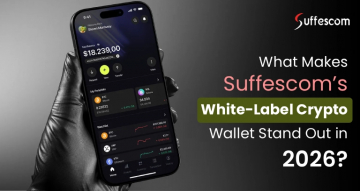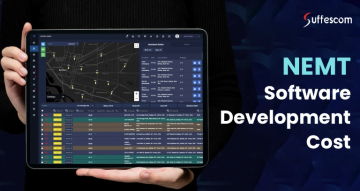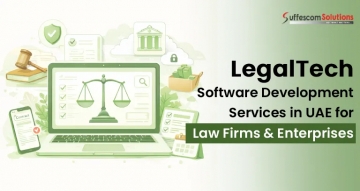How Are NFTs Impacting the DeFi Sector?

NFTs (non-fungible tokens) are no longer just digital collectibles or art pieces—they’re becoming powerful tools in the decentralized finance (DeFi) ecosystem. By enabling unique digital ownership, NFTs are unlocking new financial use cases like loan collateral, insurance, and fractionalized assets. As DeFi protocols evolve, NFTs are helping bridge the gap between real-world value and blockchain-based services, making finance more transparent, secure, and inclusive. In this article, we’ll explore how NFTs are transforming DeFi, examine real-world use cases, and highlight the leading projects at the forefront of this innovation.
Leverage The Potential Of NFT In Decentralized Finance
Connect with our NFT and blockchain development experts for more information about how NFT and DeFi together revolutionize the financial space. Contact us for a detailed consultation!
Overview of DeFi Industry:
DeFi is a blockchain-based financial management system. Payments, lending, borrowing, saving, margin trading, yield aggregation, and currency trading can all be done quickly and securely using a P2P (peer to peer) model, eliminating the need for any third parties (e.g. banks or other financial institutions).
Decentralized applications (dApps), the majority of which run on the Ethereum platform, enable DeFi services.
Leaders in the blockchain space and investors are paying close attention to decentralized finance, with both parties fully aware of the significant opportunities presented by the technology.
What are Some of the Advantages of DeFi?
There are a number of real benefits to DeFi:
Decentralization
There is no centralized authority, which means that no one has the authority to tamper with the data or change the rules at any time.
Transparency and Immutability
All transaction information is kept on the ledger and is accessible to anyone, but it cannot be changed. DeFi applications are based on cross-platform development solutions and have no geographical boundaries, allowing anyone with a stable internet connection to perform DeFi operations.
No Need for Permission
Instant access to a full range of financial services and transactions without the need to wait for requests to be verified is possible.
Interoperability
DeFi solutions are extremely adaptable and can be tailored to the specific needs of their users. Furthermore, existing protocols can be used to create dApps, and third-party applications can be attached.
A Quick Look at NFTs
Let's return to NFTs now. The term "non-fungible token" refers to real-world items that are recorded on the blockchain as unique digital assets. An NFT can take many different forms, ranging from images and videos to tickets and real estate. NFTs, unlike fungible tokens like Bitcoin, are unique and have distinct characteristics.
NFTs caused a stir in the art world because they allow artists to profit from their work without relying on middlemen such as galleries or auction houses.
Gamers have also praised the benefits of incorporating non-fungible tokens into the gaming experience: it's now legal to trade in-game assets and participate in P2E NFT game platform (pay to earn) games, where the goal is to earn money while playing.
What are the Advantages of Using NFTs?
The following are the key characteristics that make NFT such a popular technology:
Proof of Ownership
The author's information is permanently stored on the token's metadata, and regardless of how many hands an NFT passes through, the creator retains all authorship rights and receives the total sum of royalties.
Uniqueness
As the name implies, a non-fungible token is one-of-a-kind, with no possibility of duplication.
Transparency
Because the metadata of NFTs is open to the public, it is simple to verify the authenticity of a token, as well as view its previous owners and price history.
Investment Potential
Because NFTs have a tendency to become extremely expensive overnight, there's a chance you'll buy a token for a low price only to find out later that its value has more than doubled.
What Role do NFTs Play in DeFi?
It's obvious that NFTs can make a significant difference in a variety of traditional operations, but what value can they add to the financial sector?
Traditional centralized finance has always been governed by governing authorities who monitor transactions, investments, and trade contracts to ensure that they are trustworthy and accountable. However, this approach has drawbacks: going through verification and approval can be a lengthy process that causes not only physical delays but also financial costs. Not to mention that when there are too many people involved, the chances of fraud or error increase.
Decentralized finance, on the other hand, is a solution to these problems, providing a transparent and efficient method of managing finances while maintaining privacy and security.
Isn't that appealing? Wait until NFT enters the picture!
NFT is being used in many DeFi projects because of its ability to store value and serve as an immutable proof of ownership. DeFi, on the other hand, assists in unlocking this value and performing a variety of operations with tokenized assets. These two technologies complement each other and provide new financial opportunities.
The Most Common Applications of NFTs in DeFi
Loan collateralization, fractional ownership, insurance, and debt management are just a few of the DeFi aspects that can benefit greatly from the adoption of NFTs.
Complete a Full of Loans
The bank determines the amount of collateralization in the traditional system, but what if the lenders decide? When it comes to DeFi, this is exactly what happens.
NFTs make it easier to secure collateralized loans because the borrower can present a token to reduce the lender's risk if the loan is not repaid. To make a calculated decision, the lender can look at the current price of the NFT, secondary market trends, and demand for that particular type of asset. As a result, NFT lending has become the most popular decentralized finance segment, with TVL expected to reach $49 billion by 2021. NFT owners can request loans through a variety of platforms, including Arcade, Genesis, NFTfi, PawnFi, and TrustNFT.
Let's look in more detail. The Ethereum-based platform allows for peer-to-peer lending and borrowing. The Pawn protocol, which combines decentralized finance and NFTs, is used by Arcade. As collateral, any ERC20 token (including wETH, USDC, and DAI) can be used.
Borrowers must specify the desired amount of money, the currency, the payout amount, and the loan term when applying for a loan. Interest rates differ depending on the type of NFT, the loan-to-value ratio, and the loan's duration. Typically, the average interest rate is around 20%.
Get Innovative Solutions For NFT And DeFi Related Software Development
Our NFT and blockchain development team are the ultimate professionals, immaculately executing the most sophisticated and difficult projects. Contact us to explore the endless possibilities.
Ownership Fractionized
Because some non-fungible tokens are extremely expensive, it may take a long time for a potential customer to show up. No matter how if the token is divided the price into different buyers, increasing assets liquidity.
The Fractional platform, for example, allows you to split NFTs and generate ERC20-compliant fractions. Apart from increasing liquidity, the platform enables people to become fractional owners of collectibles that they would otherwise be unable to afford.
Insurance
DeFi and NFT will also affect the insurance industry as well as crypto assets and traditional insurance products.insurance policies are converted into NFTs it can be transferred, purchased and sold. Because non-fungible tokens do not have an expiration date, you do not need to renew documents on a regular basis or go through the time-consuming process of gathering all relevant documents and meeting with bank officers for verification.
One of the projects that combines NFT and DeFi for effective insurance management is CoverCompared. The solution's goal is to reduce insurance premiums, as well as transactional and administrative costs. On a native marketplace, CoverCompared's products can be purchased with a variety of cryptocurrencies. The platform is working to give multinational insurance providers easy access to all global insurance products, including crypto-related protection, health, life, and travel policies.
Debt Management
Debt management is another area of finance that can benefit significantly from the adoption of NFT DeFi. The more people a company needs to keep track of its finances, including debt issues, the larger it becomes. Smart contracts can be used to automate recurring tasks such as approvals and calculations, reducing time spent and eliminating human error. Furthermore, because decentralized finance is based on blockchain, all data is stored on the ledger and can be checked at any time.
Furthermore, if the debt you owe someone has an NFT as collateral, you won't have to worry if the borrower can't pay you back. You will automatically receive the NFT in this situation, and no court action is required.
Top DeFi Projects Leveraging NFTs
Many developers are taking advantage of the NFT DeFi combination's wide range of potential applications, including Uniswap3, Solv Protocol, Charged Particles, NFTfi, Burnt Finance, WiVX, Pods, and Just Liquidity, to name a few.
Let's look at these options in more detail:
Uniswap3
Uniswap is a DeFi protocol for automated liquidity provision and cryptocurrency exchange. Uniswap3 addressed the issue of impermanent loss (which is common in the Curve protocol) by introducing non-fungible liquidity pools, resulting in a completely new application for NFTs.
Liquidity providers no longer have to spread their capital across the entire pool; instead, they can allocate their capital to a specific price range. This means that liquidity providers can increase their exposure to desired assets while lowering their risk.
Protocol Solv
Solv Protocol is a DeFi platform that allows for the creation and trading of non-fungible financial tokens known as Solv Vouchers. Vouchers are a type of derivative that represents vesting assets, such as tokens. The total value of these vouchers is $75 million at the time of writing. The assets are locked and then released on a regular basis. Such a system ensures investors' and team members' long-term commitment, resulting in the project's growth and prosperity being reinforced.
In most cases, locked assets are illiquid, and the only way to claim them is to wait for the vesting period to end. Owners of locked assets can now exercise active control over their assets with Solv Vouchers, including buying and selling, splitting, and merging vouchers into larger entities. To make the implementation and programming of advanced financial products easier, Solv Protocol issues financial NFTs with the ERC-3525 token standard.
Particles with Charge
Charged Particles is a protocol that allows any token (for example, ERC-20 or ERC-721) to be deposited into a network of trust (NFT). Non-fungible tokens thus become a virtual basket containing a variety of digital assets. You can generate yield-bearing assets by depositing Aave tokens into an NFT, which are then converted to aTokens by the protocol. Because the interest generated is programmable, you have complete control over it and can send it to any wallet.
Virtual geocaching, entertainment NFTs, NFT-based savings accounts, and charity art sales can all be done with these tokens.
NFTfi
NFTfi is a non-fungible token liquidity protocol. The solution allows for peer-to-peer and completely trustless NFT lending and borrowing. NFT liquidity providers use NFTfi to earn attractive yields or to obtain valuable NFTs in the event of loan defaults.
NFTfi is currently only available on the Ethereum blockchain, but it will be available on Flow soon.
Burnt Finance
On the Solana blockchain, Burnt Finance is a decentralized NFT auction protocol. The platform hosts digital asset auctions and fundraising campaigns, as well as allowing users to build their own NFT collections.
Burnt Finance is known for its fast processing times (400 milliseconds) and low transaction costs ($0.01). The project will grow and develop an NFT marketplace with full DeFi functionality, such as lending, liquidity mining with staking incentives, fractionalization, and GameFi.
WiVX
WiVX is a protocol for decentralized reserve tokens. WiVX was introduced as a blockchain-based wine investment platform by WiV Technology.
A case of wine is represented by each WiV token. Real-life wine is your property if you own a token. All wine cases are safely stored in either the owner's professional warehouse or within WiVX's merchant network. The wine will be delivered to the owner upon request. The tokens can be used to start a collection, trade them, or even use them as loan collateral.
Pods
Pods is a non-custodial non-centralized options protocol that makes it simple to hedge cryptocurrency in the NFT DeFi domain. Pods joined the Galaxy ecosystem in October 2021 and launched their NFT reward program. According to this program, rewards will be given to the community's early adopters and most active members.
The first season of the reward program, The Awakening, featured three NFT groups. Holders of Pods NFTs will be able to vote on governance proposals, take certain positions in the community, and participate in early testing and research groups in the future.
Simply Liquidity
Just Liquidity is a financial system that aims to provide a completely decentralized experience with global fiat applications like Visa and Mastercard Debit Cards. The system now includes an DeFi staking development model.
The user can stake their tokens in a pool for a set amount of time and then get an NFT to get into the next pool. The NFT functions as an entry ticket into a new pool, and it expires once the user enters it.
The NFT staking model developed by JustLiquidity creates a secondary market for these NFTs based on the access provided.
Ready To Launch Your Own NFT Marketplace?
We at Suffescom Solutions - A leading DeFi Development Company extends our services in the booming NFT marketplace too. We are here to assist you with unbeatable NFT Marketplace Development Services.
Conclusion
Even though it is still in its early stages, non-fungible token technology is making a significant impact in the DeFi world, having penetrated the very core of its operations. The combination of NFT and DeFi now appears to be serious game-changers in all aspects of finance management, and we're watching the future development of these cutting-edge solutions with bated breath.
Do you have a game-changing idea but aren't sure how to put it into action? Our development team is a true professional, completing even the most difficult and complex projects flawlessly. Contact us for a detailed consultation on NFT and blockchain development, as well as traditional software development.
FAQs
1. How are NFTs used in DeFi?
NFTs are used in DeFi as loan collateral, insurance policies, yield-generating assets, and tools for asset tokenization. Their unique ownership and traceability features make them ideal for secure, verifiable transactions in decentralized finance.
2. Can NFTs be used as collateral in DeFi loans?
Yes. Many DeFi platforms allow users to lock NFTs as collateral to borrow crypto assets. Smart contracts ensure the NFT is held securely until the loan is repaid or liquidated, reducing the need for traditional credit checks.
3. What are the benefits of integrating NFTs into DeFi?
NFT integration in DeFi enables:
- Improved transparency
- Programmable financial agreements
- Asset fractionalization
- Greater liquidity for traditionally illiquid assets
- Personalized insurance and debt contracts
4. Which DeFi platforms are using NFTs?
Several leading platforms use NFTs in their protocols, including:
- Uniswap V3 – for NFT-based liquidity positions
- NFTfi – for peer-to-peer NFT-backed loans
- Solv Protocol – for NFT-based financial instruments
- Charged Particles – for DeFi-enabled NFT wallets
5. What is NFT fractionalization in DeFi?
NFT fractionalization is the process of dividing a single NFT into multiple fungible tokens, allowing users to own and trade fractions of high-value NFTs. This increases liquidity and opens investment access to a broader audience in the DeFi ecosystem.
6. How do NFTs improve DeFi insurance models?
NFTs can represent custom insurance policies or claims, making them tradable and verifiable on-chain. This improves claim transparency, automates payouts via smart contracts, and reduces administrative overhead.
7. Are NFT-backed loans secure?
Yes, when executed through audited smart contracts on trusted DeFi platforms. These contracts ensure the NFT collateral is locked and managed transparently, reducing counterparty risk.







